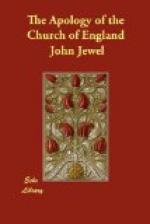PART II.
We believe that there is one certain nature and Divine power, which we call God: and that the same is divided into three equal Persons—into the Father, into the Son, and into the Holy Ghost; and that They all be of one power, of one majesty, of one eternity, of one Godhead, and of one substance. And although these three Persons be so divided, that neither the Father is the Son, nor the Son is the Holy Ghost, or the Father; yet, nevertheless, we believe that there is but one very God, and that the same one God hath created heaven, and earth, and all things contained under heaven.
We believe that Jesus Christ, the only Son of the eternal Father (as long before it was determined before all beginnings), when the fulness of time was come, did take of that blessed and pure Virgin both flesh and all the nature of man, that He might declare to the world the secret and hid will of His Father; which will had been laid up from before all ages and generations; and that He might full finish in His human body the mystery of our redemption; and might fasten our sins to the cross, and also that handwriting which was made against us.
We believe that for our sakes He died, and was buried, descended into hell, the third day by the power of His Godhead returned to life, and rose again; and that the fortieth day after His resurrection, whiles His disciples beheld and looked upon Him He ascended into heaven to fulfil all things, and did place in majesty and glory the self-same body wherewith He was born, wherein He lived on earth, wherein He was jested at, wherein He had suffered most painful torments and cruel kind of death, wherein He rose again, and wherein He ascended to the right hand of the Father, “above all rule, above all power, all force, all dominion, and above every name that is named, not only in this world, but also in the world to come:” and that there He now sitteth, and shall sit, till all things be full perfected. And although the Majesty and Godhead of Christ be everywhere abundantly dispersed, yet we believe that his body, as St. Augustine saith, must needs be still in one place; and that Christ hath given majesty unto His body, but yet hath not taken away from it the nature of a body; and that we must not so affirm Christ to be God that we deny Him to be man: and, as the Martyr Vigilius saith, that Christ hath left us as touching His human nature, but hath not left us as touching His Divine nature; and that the same Christ, though He be absent from us concerning His manhood, yet is ever present with us concerning his Godhead.
From that place also we believe that Christ shall come again to execute that general judgment, as well of them whom He shall then find alive in the body as of them that be already dead.




